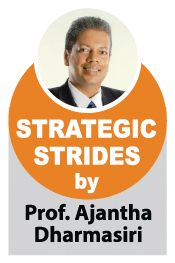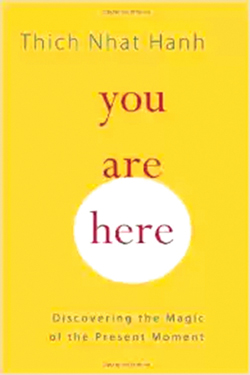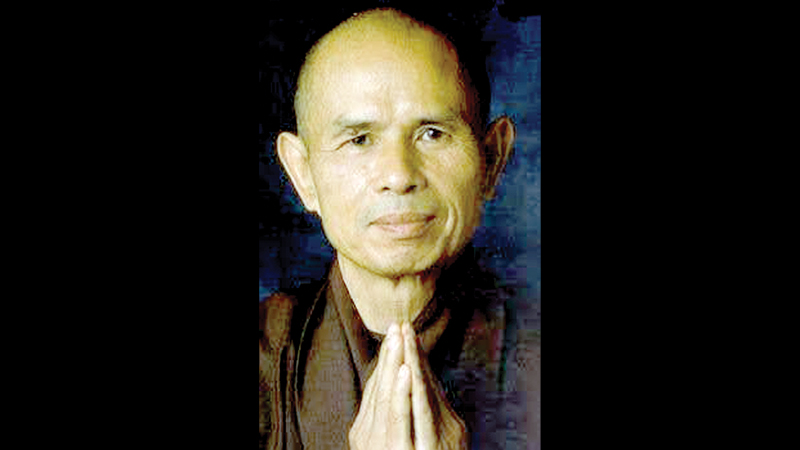 Iread a refreshingly resourceful book titled, ‘You are here’ written by Ven. Thich Nhat Hanh (pronounced as ‘tick not hon’), a world renowned Zen bhikkhu, poet and a peace activist. His book echoes and re-echoes the vibrancy of spiritual intelligence. It invites us to appreciate our presence as a present.
Iread a refreshingly resourceful book titled, ‘You are here’ written by Ven. Thich Nhat Hanh (pronounced as ‘tick not hon’), a world renowned Zen bhikkhu, poet and a peace activist. His book echoes and re-echoes the vibrancy of spiritual intelligence. It invites us to appreciate our presence as a present.
Today’s column is a reflection of spirituality in the management context, stemming from ‘you are here’.
Overview
‘What we are today comes from our thoughts of yesterday, and our present thoughts build our life of tomorrow; Our life is the creation of our mind.’ said Buddha, in highlighting the significance of mind-body relationship. As he vividly puts it, ‘Samma Ditti ‘ (right seeing) leads to ‘Samma Vayama’ (right action). You can’t go ahead and achieve something noble unless you see it clearly. In simple terms, clear thinking leads to clever action.
“Every breath we take, every step we make, can be filled with peace, joy and serenity,” says Ven. Hanh. He invites us to discover the magic of the present moment. “People sacrifice the present for the future. But life is available only in the present. That is why we should walk in such a way that every step can bring us to the here and the now.”
The whole issue is that either we live in the past or in the future. Psychologists often observe that people need to practise present moment living. It links to the broader aspect of spirituality.
Spirituality
Let’s see spirituality from a management perspective. It involves a term for many beliefs and practices intended to develop one’s inner life. It is associated with a feeling of interconnectedness.
In other words, it is the vital principle that gives breadth of life to physical organisms.
“Freedom is not given to us by anyone; we have to cultivate it ourselves. It is a daily practice. No one can prevent you from being aware of each step you take or each breath in and breathe out,” says Ven. Hanh.
It beautifully blends with what Dan Zoar, the author of Spiritual Intelligence shares. According to her, spirituality is to ‘know’ who you are and Spiritual Intelligence is to ‘realise’ who you are and to live life in that awareness. You have always been who you are and, in truth, you can never be other than who you are, but it requires ‘realisation’ i.e. that moment when you ‘see it’, when you ‘get it’ and then you ‘be it’.
Spirituality is different to being religious. You can go to all the religious places in the world but if you do not demonstrate values in your actions, you are not spiritual yet. Being spiritual is essentially maintaining three connections. They are: connecting to self, to others and to the universe (higher being).
Spiritual intelligence
According to Zohar and Marshall (1997), it is the intelligence that makes us whole, that gives us our integrity. It is the intelligence of the deep self.
It is the intelligence with which we ask fundamental questions and with which we reframe our answers.
Kathleen Noble (2000) tells us that it is the conscious recognition that physical reality is embedded within a larger, multidimensional reality with which we interact, consciously and unconsciously, on a moment to moment basis. In brief, it is the conscious pursuit of psychological health, not only for ourselves but also for the sake of the global community.
It can even be simplified further as Tony Buzan (2001) did. Spiritual intelligence is the awareness of the world and your place in it. It is also the ability to act with wisdom and compassion, while maintaining inner and outer peace, regardless of the circumstances (Wigglesworth, 2004).
Therefore, it is interesting to see a distinctly different intelligence emerging in the form of spiritual intelligence. What are the ingredients of it? Let’s discover now.
Components of spiritual intelligence
 “It is possible to live happily in the here and now. So many conditions of happiness are available — more than enough for you to be happy right now. You don’t have to run into the future in order to get more,” says Ven. Hanh. What should we do then? Based on the work done by Zohar and Marshall (1997), the following have been highlighted as key components.
“It is possible to live happily in the here and now. So many conditions of happiness are available — more than enough for you to be happy right now. You don’t have to run into the future in order to get more,” says Ven. Hanh. What should we do then? Based on the work done by Zohar and Marshall (1997), the following have been highlighted as key components.
Self awareness
Knowing what I believe in and value, and what deeply motivates me. As Thich Nhat Hanh said once, “feelings come and go like clouds in a windy sky. Conscious breathing is my anchor”.
Spontaneity
Living in and being responsive to the moment.
Being vision and value led
Acting from principles and deep beliefs, and living accordingly.
Holism
Seeing larger patterns, relationships, and connections; having a sense of belonging.
Compassion
Having the quality of ‘feeling-with’ and deep empathy.
Celebration of diversity
Valuing other people for their differences, not despising them.
Field independence
Standing against the crowd and having one’s own convictions.
Humility
Having the sense of being a player in a larger drama, of one’s true place in the world.
Tendency to ask fundamental ‘Why?’ questions
Needing to understand things and get to the bottom of them.
Ability to reframe
Standing back from a situation or problem and seeing the bigger picture; seeing problems in a wider context.
Positive use of adversity
Learning and growing from mistakes, setbacks, and suffering.
Sense of vocation
Feeling called upon to serve, to give something back.
Having looked into the components of spiritual intelligence, it will be interesting to see its connection to values.
Values as the core
Jim Collins’ best-selling book, ‘Built to Last: Successful Habits of Visionary Companies’ concludes that truly great companies are visionary and value driven. In his latest book, ‘Good to Great: Why Some Companies Make the Leap and Others Don’t,’) Jim Collins researched 11 companies who made the transition from being good companies to being ‘great’ companies on par with the companies in ‘Built to Last’. A key finding was that each company had what he calls ‘Level 5 Leadership’ or in simple terms, leadership at its greatest level.
The logical connection here is that great leaders seem to demonstrate most or all of the characteristics described as Spiritual Intelligence by Zohar. Great leaders showed a profound personal humility and a powerful faith that they and their company would prevail in the end, regardless of the difficulties. ‘We humans have lost the wisdom of genuinely resting and relaxing. We worry too much. We don’t allow our bodies to heal, and we don’t allow our minds and hearts to heal’, observes Rev. Hanh.
Spiritual intelligence as five-fold capacities
Robert Emmons (2000) illuminates us on five key capacities of spiritual intelligence. They are:
l Capacity to transcend the physical and material.
This refers to the mental action of thinking beyond what is seen. It involves a deep level of thinking.
2. Capacity to experience heightened states of consciousness.
This is essentially mindfulness. An area where conscious breathing can be of very high importance.
3. Capacity to sanctify everyday experience.
In simplifying, this refers to accepting things as they are rather than as they ought to be. It makes one positive and constructive.
4. Capacity to use spiritual resources to solve problems.
Relying on your ‘built in wisdom ‘or trusting the gut in approaching problems where there is no precedence is what it means.
5. Capacity to be virtuous.
The reference here is to be ethical in demonstrating values in action.
It seems the common thread that cuts across all above aspects is connectivity.
SI in action
Spirituality should be reflected in action. Four Zen-like principles which are simple as ideas yet so deep as actions shed light on this.
Whoever comes is the right person.
Whatever happens is the only thing that could have happened.
Whenever it starts it is the right time.
Whenever it is over, it is over.
By practising spiritual intelligence, Seven Sins in the world as identified by Mahatma Gandhi can be overcome, at least where an individual has some influence.
* Wealth without work
* Pleasure before conscience
* Knowledge without character
* Commerce without morality
* Science without humanity
* Worship without sacrifice
* Politics without principle
Way forward
What we have done so far is just to experience a drop from a vast ocean. It is just an introduction to a theme which is vastly experiential. Our rational intelligence will tell us what we know. Our emotional intelligence will tell us how we feel. Our spiritual intelligence will tell us who we are. It is all about being. Let’s be human beings and not ‘human doings’ or ‘human undoings’.
“It is possible to live happily in the here and now. So many conditions of happiness are available — more than enough for you to be happy right now. You don’t have to run into the future in order to get more,” Ven. Thich Nhat Hanh meaningfully summarises the power of presence.
Discovering the magic of the present moment is more a journey than a destination. Let that inward journey be a meaningful one.






